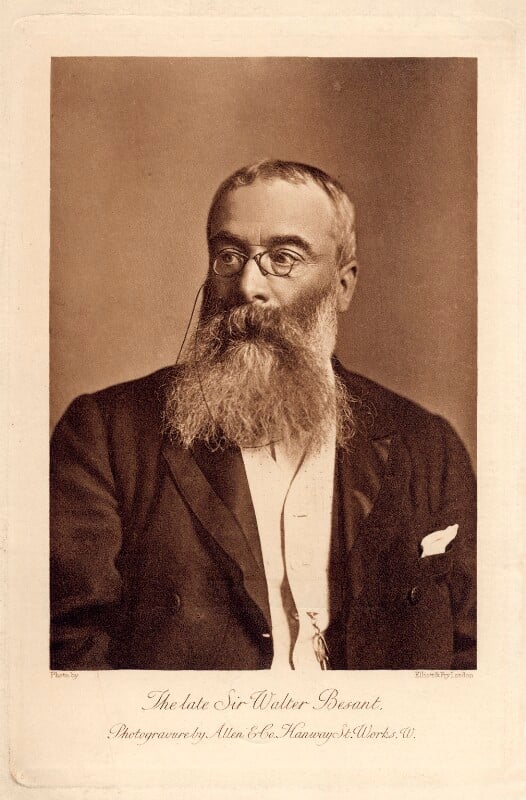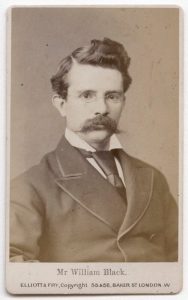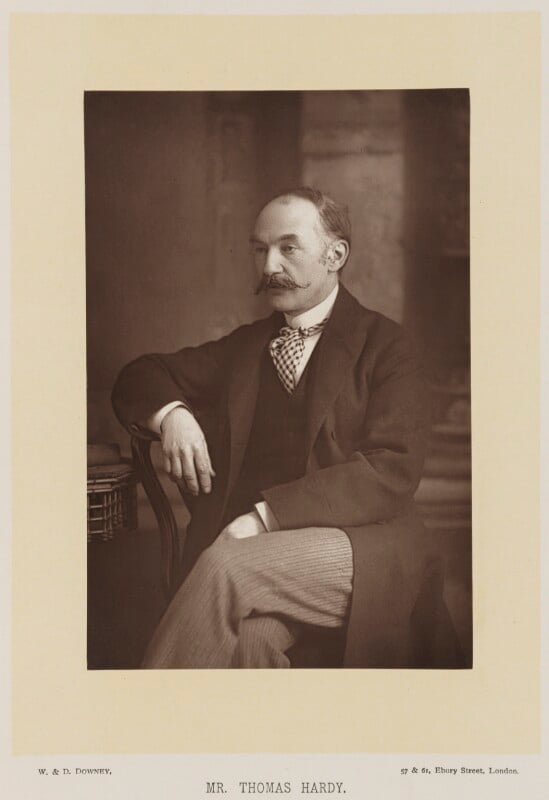
Sir Walter Besant by Elliott & Fry, printed by Allen & Co • sepia photogravure, mid 1890s NPG x126490 • © National Portrait Gallery, London • NPG

William Black by Elliott & Fry, albumen carte-de-visite, 1870s • NPG x136255© National Portrait Gallery, London • NPG

Thomas Hardy by W. & D. Downey • published by Cassell & Company, Ltd • carbon print, published 1894 NPG Ax27917 • © National Portrait Gallery, London • NPG
Publication history
This ballad was first published in The Athenænum on 6 December 1890, without the Headnote which was not added until it was collected. See the new (Feb 2010) Bibliography by David Alan Richards (pp. 74, 372, and 538); also ORG Vol. 8 p. 5309 (Verse No. 425).
It is collected in
- Barrack-Room Ballads (USA), and Barrack Room Ballads and Other Verses (UK)
- Inclusive Verse
- Definitive Verse
- The Sussex Edition Vol. 32, page 274
- The Burwash Edition, Vol. 25
- The Works of Rudyard Kipling (Wordsworth Poetry Library)
The theme
At first sight this is an epic ballad on a grand scale, reminiscent of the fourteen-syllable lines of Macaulay’s magnificent “The Armada”:
Attend all ye who list to hear our noble England’s praise
I tell of the thrice-famous deeds she wrought in ancient days…
Kipling’s poem describes a British trading brig, which has encountered an American pirate vessel which stripped her of her cargo and of anything moveable. Much of the poem is taken up with lurid descriptions of the painful torments her skipper would like to inflict on the pirate if he had him at his mercy. He turns to the great captains of the Royal Navy for aid, and is furious to be turned away. They are trading with the pirate and will not help him.
In fact “The Rhyme of the Three Captains” turns out to be a tirade against Harper and Brothers, the American publishers, for what Kipling saw as their piratical theft of his work, and against three leading British authors of the day, Sir Walter Besant, Thomas Hardy, and William Black, who had failed to support him. The poem is written in a mood of savage indignation, and the young Kipling—aged twentyfour, and only recently settled in London—has scattered it with nautical expressions, some entirely out of context, some wrongly applied, and some of his own devising. We have tried to elucidate these for interested readers in the Notes on the text.
Minor technical errors, however, are unimportant. It would be small-minded to cavil at them in such an enjoyable and rollicking yarn in verse, which should perhaps be read in the same spirit as “The Cummerbund – An Indian Poem” by Edward Lear, or “Archie Experiences a Seizure“, by Don Marquis.
Kipling later used a similar nautical metaphor for the sales of his work in “Two Forewords” addressed to Doubledays, who became his American publishers, and with whom he had excellent relations. The poem contains several examples of American usage which Kipling may well have acquired from friends he met in India, including Edmonia Hill, the wife of Professor Alex Hill, who figures in some of the Indian stories, and in From Sea to Sea. See Charles Allen (p. 251).
Background
Kipling had arrived in London in October 1889, and soared into the literary landscape like a meteor. The Times saluted him in a leading article on 25 March 1890:
India has given us an abundance of soldiers and administrators, but she has seldom given us a writer. There is no question, however, that she has done this in the person of the author of the numerous short stories and verses of which we give the titles below. Mr. Rudyard Kipling has the merit of having tapped a new vein, and of having worked it out with real ingenuity … He soon showed that his faculties of keen observation and incisive writing were already developed to an extent far beyond his years…
There was clearly serious money to be made here. Within Britain and the Empire there were copyright laws which protected an author’s rights in his work. However, in the nineteenth century the position was much less well defined in the United States, which was as big a market. In the 1890s, as Kipling’s work became highly popular, many unscrupulous American publishers simply issued editions without permission (thus styled ‘pirate editions’), and without paying royalties to the author.
While in America on his way to England Kipling had been introduced to Henry Harper, of Harper and Brothers, the leading American publishing house, who had snubbed him: ‘Young man, this house is devoted to the production of literature’. See Andrew Lycett (p. 178). In 1890, Harpers acquired serial rights for a number of his stories for publication in Harper’s Weekly, for which they duly paid. However in September, as Lycett (p. 226) recounts:
… he was furious when Harper and Brothers, the company which had snubbed him in New York less than a year earlier, informed him casually that, without his prior permission, it intended publishing a cheap edition of six of his stories. [called The Courting of Dinah Shadd and Other Stories, incidentally the first book to be published with Kipling’s portrait: Richards p. 50] It had bought serial rights for five of these [for the magazine] (which made its action questionable, but strictly legitimate), but for the sixth, “The Incarnation of Krishna Mulvaney”, it did not even have this basic cover. To make matters worse, it offered a £10 `honorarium’ which Rudyard described to Henley as `the wages of one New York road
scavenger for one month’.
Kipling wrote to The Athenaeum:
Am I or am I not right in re-affirming that Messrs. Harper and Brothers appropriated my tales without asking permission, had not the courtesy to allow me to revise proofs before jamming them into a job-work volume, and sent me a ten-pound note as a notification of outrage perpetuated….
The real trouble, of course, is not with this or that picaroon across the water. The high seas of literature are unprotected, and those who traffic in them must run their chance of being plundered. If Messrs. Harper & Brothers had not taken my stories, some other long or short firm would have done so. Only, a pretentiously moral pirate is rather more irritating than a genuine Paul Jones. The latter, at least, does not
waste your time and ink.
Kipling’s letter appeared in The Athenaeum on 8 November, 1890, and is collected in The Letters of Rudyard Kipling, edited by Thomas Pinney (Vol. 2 p. 25.) [This letter of Kipling’s, Harper’s reply, and the joint letter of Messrs Hardy Besant and Black commenting on the controversy and discussed below, were first collected in “The Courting of Dinah Shadd, a contribution to a bibliography of the writings of Rudyard Kipling” published in 1898 by Paul Lemperly ( Richards p. 372)]
While loss of income through defective copyright law was indeed a very important issue for a young and struggling author, as Kingsley Amis observes below, one cannot help wondering how serious Kipling was once he got into his stride in the poem (about line 30 onwards) as he is obviously enjoying himself inventing fantastic punishments for the alleged pirates and their accomplices. One is reminded of a passage in “Slaves of the Lamp” Part I, where King has just been holding Beetle up to ridicule. Stalky’s first thought is for revenge:
‘Beetle! You’re oppressed and insulted and bullied by King. Don’t you feel it?’
‘Let me alone! I can write some more poetry about him if I am, I suppose.’
[Stalky & Co. p. 46 line 16]
However, Amis (p. 59) records Kipling’s problems with American copyrights soon after he arrived in London, which he describes as:
…especially bothersome to a young man short of money. Some of this put itself self right over the following few months … He was writing and being printed at top speed, by the end of 1890 he was famous in England and America. His Barrack-Room Ballads and a number of stories had come out in periodicals. The Times had pronounced favourably and at length on Plain Tales from the Hills. He had finished and published (in the U.S.) The Light that Failed, and his Indian Railway Library tales had appeared in collections as Soldiers Three and Wee Willie Winkie.
The response of Hardy Besant and Black can be found here (p. 701, cols 1-2). For earlier correspondence, see the volume’s index:
Kipling and the ‘Three Captains’
Marghanita Laski (p. 80) recounts how Sir Walter Besant introduced Kipling to A. P. Watt, the literary agent, who doubled his income in three months. She continues:
… but no agent could protect an author from barefaced pirating in the United States where works were reprinted with no payment of copyright fees. Kipling’s public fury with the American Harper’s was not soothed by a letter in The Athenænum from the novelists Walter Besant, Thomas Hardy and Walter Black, defending Harper’s. Kipling exploded in “The Rhyme of the Three Captains”, a swashbuckling diatribe of a poem, also published in The Athenænum, in which the offending authors identified by pun— ‘the bezant is hard, ay, and black’ (line 87)—were sending whimpering flags of surrender to the pirate fleet, with Kipling as the fearless skipper of a lone, brave privateer.
Besant and Hardy had, with others, supported Kipling’s membership of the Savile Club, and all three were leading literary figures of the day. All were at least twice Kipling’s age. See Charles Carrington (p. 139).
William Black (1841–1898), was a novelist, journalist, and war correspondent.
Thomas Hardy (1840–1928), was a major novelist and poet, author of Far from the Madding Crowd, and The Mayor of Casterbridge and many other widely read novels. He was much admired by Kipling, and is thought to have been the original of Eustace Cleever, in “A Conference of the Powers” in Many Inventions (1893): See Angus Wilson (p. 140).
Sir Walter Besant (1836–1901) was an active writer and campaigner for authors’ rights, The prime mover in establishing the Society of Authors, he took the Chair at the initial meeting on 28 September 1883. He was the author of, inter alia, The Chaplain of the Fleet (1881).
In Thomas Hardy, A Biography Revisited, Michael Millgate records (p.284):
Rudyard Kipling wrote to The Athenænum in November 1890 to accuse Harper & Brothers of sharp practice. Hardy, prompted by Osgood (one of his publishers, Ed.), felt obliged to join with Walter Besant and William Black, in sending to The Athenæumi a letter testifying to their personal experience of unfailing fairness and liberality on Harper’s part. The letter was not intended as an attack upon Kipling himself, nor did Kipling regard it as such, but his poem “The Rhyme of the Three Captains”, first published in The Athenæum on 6 December, nevertheless made lively fun of Hardy and his co-signatories by demonstrating:
How a man may be robbed in a Christian port while Three Great Captains there
Shall dip their flag to a pirate rag to show that his trade is fair.
The aftermath
As Thomas Pinney notes (p.26):
Harpers withdrew “The Incarnation of Krishna Mulvaney” from the Dinah Shadd volume, and substituted “The Record of Badalia Herodsfoot” which had earlier appeared in Harper’s Weekly. At the same time they complained (see Richards p. 50) that Kipling’s attack was ungracious and self-defeating, since it would not prevent other publishers, who had paid him nothing, from reprinting his work in the US. RK later agreed with them. In a note dated 6 May 1898 [contained in a copy of the Harper’s second edition, now in the Berg Collection at the New York Public Library] he wrote:
As regards the Harper discussion there is no sense in starting a newspaper argument with anyone under any circumstances. I should have taken their money and held my tongue but in those days I thought I did well to be angry. Never again.
Thanks to the assistance of Wolcott Balestier, and later of Frank Doubleday, Kipling’s difficulties with pirate American publishers were greatly diminished from the later 1890s, although—for instance—he and Doubleday found it necessary to publish Abaft the Funnel in 1909 at a rock bottom price of 19 cents in order to head off an attempt by another American publishing house to exploit some previously uncollected tales.
Some further reading
- Michael Millgate, Thomas Hardy, A Biography Revisited, Oxford 2004
- The Oxford Companion to Ships and the Sea
- The Letters of Rudyard Kipling, volume 2: 1890-99 Ed. Thomas Pinney.
There is a fuller account of Kipling’s dealings with Harper and Brothers in Richards (pp. 49/50).
[J.R./J McG.]
©John Radcliffe and McGivering 2010 All rights reserved